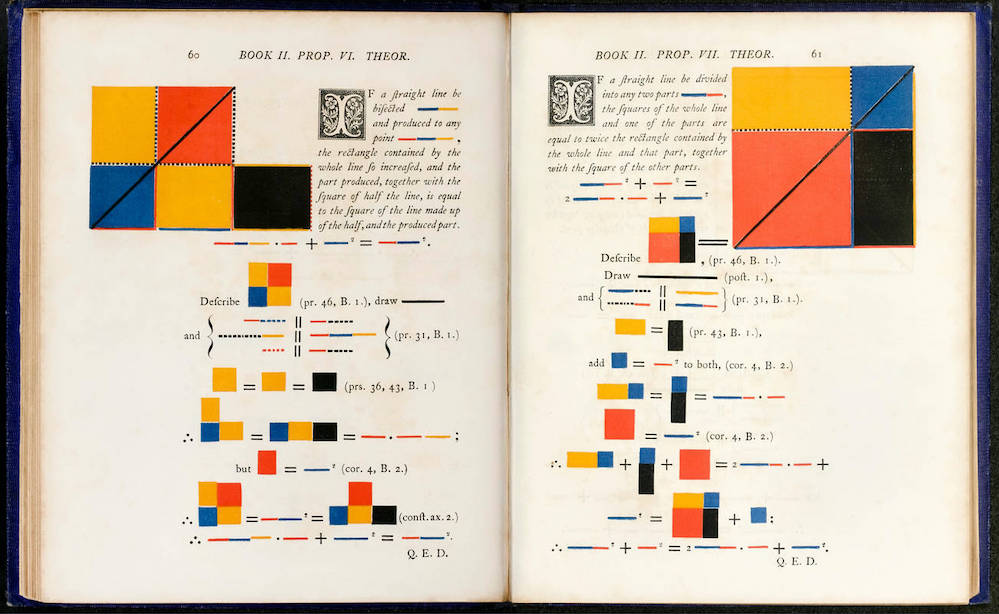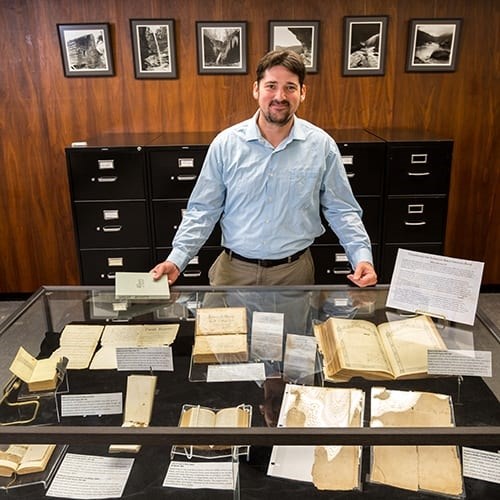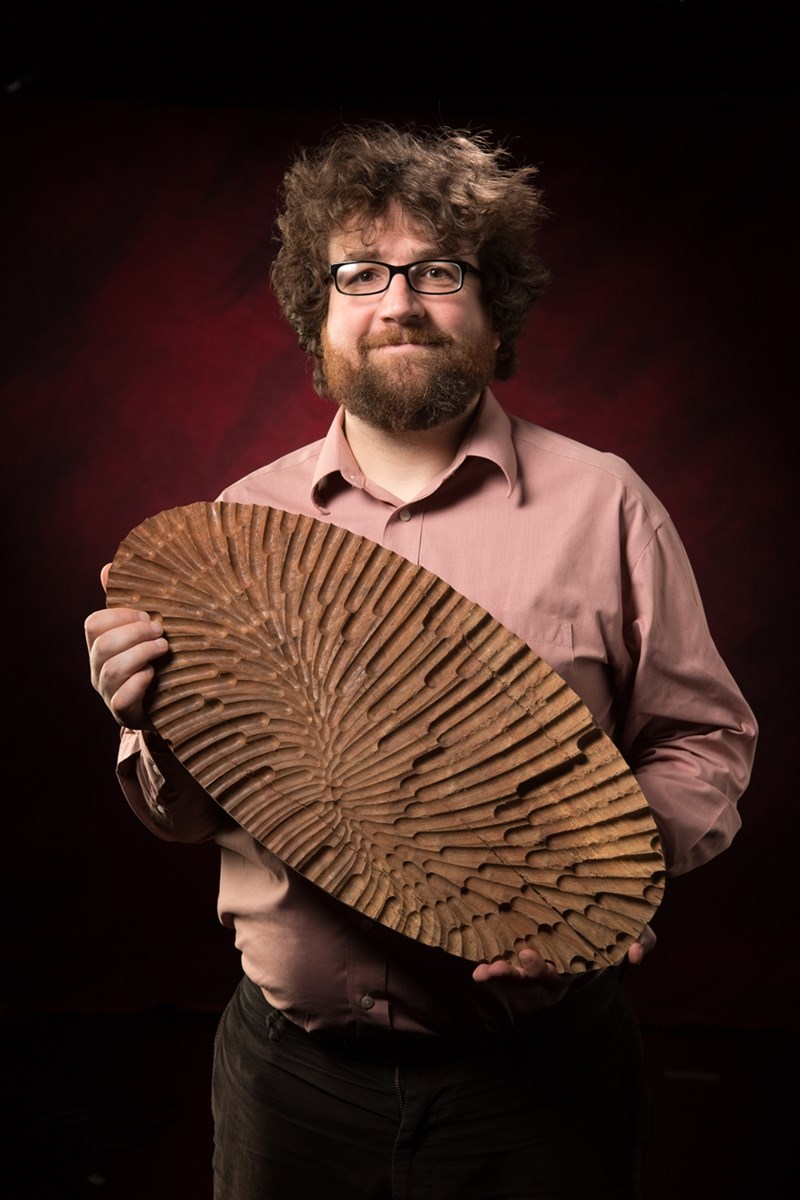Euclid

Euclid/HNRC 4013H-026
M/W/F, 11:50 a.m.-12:50 p.m., SPRING 2022
GEAR 129
View the video of the public preview lecture taped Wednesday, September 15 at 5:15 p.m.
Interested?
Current students can apply online. Deadline Extended to : 11:59 p.m., Tuesday, Nov. 2, 2021.
Questions?
Contact
John Treat
.
Apply for Honors College Courses
Euclid’s Elements weaves its way through the history of mathematics and the world. Studying the book provides an amazing insight into many topics, especially the history of the book in general and of course mathematics.
This Signature Seminar will guide students through the textual and intellectual history of Euclid. For more than 2,000 years, the mathematical concepts written up by the mathematician from Alexandria in Africa, have served as building blocks for students, theoreticians, designers, builders, and even poets and musicians. The collected books of Euclid were one of the most frequently taught texts in the world until the early 20th century and remain valuable sources of scholarly inquiry. In physics the 20th century began by finally showing how the universe quite literally bent the rules the Elements set down so long before.
Combining an interdisciplinary approach to mathematics, relying on history, intersectionality, and active creation, with analyses of the “book” as artifact and object, this course will allow Honors students to explore cultural and intellectual development over millennia though one of the most frequently cited and complex textual odysseys in the world. The mathematics of Euclid was adopted into the foundation of western civilization even though it was the work of the eastern Mediterranean. Students will seek to decolonise the historical assumptions about early mathematics and how they were understood or not understood, or willfully misunderstood.
Course Credit:
- All students: 3 hours of honors credit.
- Fulbright College:
- Honors humanities or natural science colloquium credit
- Classical Studies credit for majors and minors
- Mathematical Sciences 3000-level credit
- Walton College: honors colloquium credit
About Edmund Harriss and Joshua Youngblood:
 Joshua Youngblood serves as the Instruction and Outreach Unit Head and as Rare Books
Librarian for the Special Collections of the University of Arkansas Libraries. Joshua
also serves as the Libraries’ Arkansas subject specialist and history librarian. He
studied history and archives at Florida State University. A certified archivist, Joshua
is an active member of several professional organizations and is a recognized leader
in the areas of archival outreach and instruction. In addition to numerous conference
presentations, Joshua has published on archival curation of digital exhibits, undergraduate
research with primary sources, and the history of Arkansas and the American South
including early 20th century activism and the history of lynching and the anti-lynching
movement. Before coming to Arkansas, Joshua served as Archives Historian responsible
for digital outreach and content development for the Florida Memory Project of the
State Archives of Florida, as the public relations officer for the Florida Division
of Cultural Affairs, and as the program assistant for the Florida Main Street Program.
Joshua Youngblood serves as the Instruction and Outreach Unit Head and as Rare Books
Librarian for the Special Collections of the University of Arkansas Libraries. Joshua
also serves as the Libraries’ Arkansas subject specialist and history librarian. He
studied history and archives at Florida State University. A certified archivist, Joshua
is an active member of several professional organizations and is a recognized leader
in the areas of archival outreach and instruction. In addition to numerous conference
presentations, Joshua has published on archival curation of digital exhibits, undergraduate
research with primary sources, and the history of Arkansas and the American South
including early 20th century activism and the history of lynching and the anti-lynching
movement. Before coming to Arkansas, Joshua served as Archives Historian responsible
for digital outreach and content development for the Florida Memory Project of the
State Archives of Florida, as the public relations officer for the Florida Division
of Cultural Affairs, and as the program assistant for the Florida Main Street Program.
 Mathematician, Artist, Teacher, Maker, Edmund Harriss works to corrupt people into
mathematical thinking and experiences through toys, coloring images and more. His
research veers from illustrating algebraic numbers, through the differential geometry
of controlling CNC machines to mathematical art and perceptualism. His research has
appeared in journals including Nature, and the proceedings of the National Academy
of Science, as well as in the national and international media, including New Scientist,
NPR, the Guardian, and Numberphile. His artwork is installed in several universities
from Imperial College in London to the University of Arkansas, including a 12′ metal
sculpture currently (Fall 2021) being installed at the University of Arkansas. He
has created two adult coloring books of mathematical images which open up a large
range of mathematical topics to a wide range of people.
Mathematician, Artist, Teacher, Maker, Edmund Harriss works to corrupt people into
mathematical thinking and experiences through toys, coloring images and more. His
research veers from illustrating algebraic numbers, through the differential geometry
of controlling CNC machines to mathematical art and perceptualism. His research has
appeared in journals including Nature, and the proceedings of the National Academy
of Science, as well as in the national and international media, including New Scientist,
NPR, the Guardian, and Numberphile. His artwork is installed in several universities
from Imperial College in London to the University of Arkansas, including a 12′ metal
sculpture currently (Fall 2021) being installed at the University of Arkansas. He
has created two adult coloring books of mathematical images which open up a large
range of mathematical topics to a wide range of people.